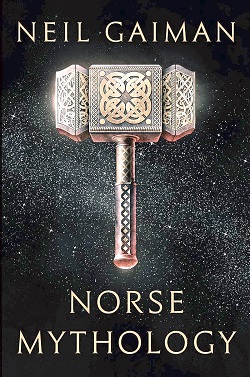 I wish I could delete the first few chapters of Neil Gaiman’s Norse Mythology, or at least move them to the back. Like any book of myths, it’s difficult not to glaze over the initial inundation of unpronounceable names (e.g., Yggdrasil, Hvergelmir), origins, and outrageous creation tales. But once you make it past there, this book is a joy to read. Gaiman is clearly in love with his subject, as he proclaims in the introduction, and he makes that evident in his lively retelling of these stories.
I wish I could delete the first few chapters of Neil Gaiman’s Norse Mythology, or at least move them to the back. Like any book of myths, it’s difficult not to glaze over the initial inundation of unpronounceable names (e.g., Yggdrasil, Hvergelmir), origins, and outrageous creation tales. But once you make it past there, this book is a joy to read. Gaiman is clearly in love with his subject, as he proclaims in the introduction, and he makes that evident in his lively retelling of these stories.
The book is broken up into very short chapters, most of which can be completed in 5 to 15-minute reads, perfect for a commute on public transport. The main characters are of course Odin, Thor, and the ever-troublesome Loki. Gaiman has fun throughout, as he explores the personalities of these old gods.
Loki tells us he cut off the hair of Thor’s wife simply because “It was funny. I was drunk.” Yet, he is smart and cunning as any character.
Thor’s standard operating procedure whenever something goes wrong is to first think “it is Loki’s fault,” because “it saves a lot of time.” Even still, he’s a little slow on the uptake of situations.
Then there’s Odin, whose origins and development are the most in-depth, as we learn how he sacrificed a piece of himself to gain ultimate knowledge. And even though he is the ruler of Asgard, he’s not afraid to get his hands dirty by disguising himself to barter and sleep with giants.
For those who have taken a mythology course in the last decade, you’ve likely been assigned Gaiman’s American Gods (2001) as required reading. This is always done as a way to show that the Norse gods live on in more than just the days of the week. Yet, Gaiman doesn’t proclaim himself an expert, just a lifelong fan. He’s not trying to establish the authoritative version of Norse tales, just provide an entertaining one that you’ll want to read. Gaiman admittedly merged and reconciled various sources and translations (Prose Edda and Poetic Edda) to create complete stories, but he still allows for conflicting versions of the tales—Gods die and return and plot holes live between chapters. For example, the source of all poetry (good and bad) has multiple possibilities and believe me, bad poetry will leave forevermore leave an aftertaste once you learn its source.
The stories are fraught with ill-placed bets, mischief, ridiculous adventures, promiscuity, magic, bestiality, and of course, extreme violence. Throughout this, there is always a tongue-in-cheek narrative to the stories that allows you to laugh along or at the gods as they stumble through adventures.
More importantly, Gaiman’s approach works well. Finishing one story makes you want to see what the gods will do next. Many of us have heard versions of these tales at some point in our lives, but with the release of Norse Mythology, Gaiman has produced the most accessible single-volume available today and for that, he deserves our gratitude.
Norse Mythology is readily available in bookstores and free to rent on your Kindle through the library, which is how I read mine.
